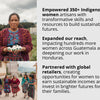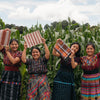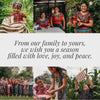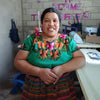Case Medical Center and Mercado Global Expand Partnership
- by Mori J Morikawa, MD, MPH

Earlier this month, myself and a consulting team from the University Hospitals Case Medical Center, Cleveland OH, visited Panajachel, Guatemala to better grasp the picture of MG artisans’ health issues. This was a follow-up of the assessment we conducted last year.
In order to evaluate what the artisans and their families are suffering from, we employed different methods: group discussions, one-on-one interviews medical examinations, and a “transcend walk” - a visit of an artisan’s home to experience and better understand their culture. The graduates of the Global Health Track, the Department of Family Medicine & Community Health, and one of their residents, joined me to volunteer their time and skills. Doctors Kate Conway, Leon Gedgeon, Hisam Goueli, Aaron Lear and Kerry Lecky were joined by Riley Asher, as a logistics assistant and my wife, Hikari, a health education and community development specialist.
We visited communities in Comalapa, and Santiago Atitlan. Taking advantage of the dry weather, we did some activities outdoors. Even dogs joined us, of course! After the group discussions, we set up stations for checking blood pressure, visual acuity, and weight and height for children, and physical examinations. With detailed preparation by the MG staff and the facilitation of their training coordinator, Barbara Quieju, everything went as we planned in the limited time frame.
The key findings that emerged out of these community visits were: 1. What the artisans believe is wrong with them does not necessarily match with what we find in our medical examinations. 2. Any aches and pains are amenable to simple physical exercises and behavioral modifications even though community members strongly believe only pills can take care of them. 3. Some of the pains and anxieties are manifestations of pervasive psycho-social stresses and trauma; stunting among children is no exception in both communities.
In the extensive discussions on the findings, we came to conclude that community based interventions would help the artisans solve and prevent many of their health problems themselves and stay healthy enough to continue supporting their families through their work with MG.
I am extremely excited to work with Mercado Global, whose philosophy is no different from mine as a global health practitioner. I believe the partnership between MG and the Department of Family Medicine & Community Health, Case Medical Center/Case Western Reserve University can make a difference for the lives of the indigenous populations.
Mori J Morikawa, MD, MPH
Director, Global Health Track
Ann S. & Anthony Asher Chair in Family Medicine & Community Health
University Hospitals Case Medical Center/Case Western Reserve University
- Posted in:
- Guatemala
- Health
- Partnership
- Training





